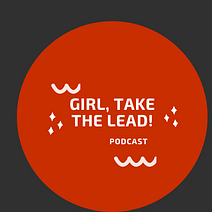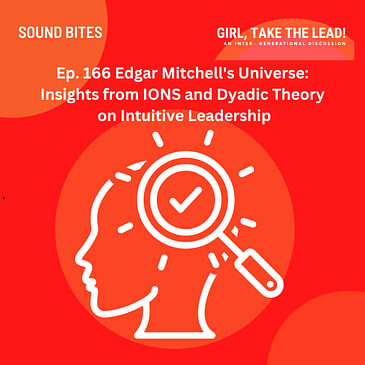This is Girl Take the Lead Sound Bite building on our discussion with Claire Lachance in Ep 165. She talked about noetic sciences and “Wisdom Leadership” - and we thought you'd like to join us to learn more.
The research for the episode included looking at:
- The history of the Institute of Noetic Sciences (IONS)
- The role of Edgar Mitchell IONS research goals & hypothesis
- Dyadic theory Intuitive leadership
Here are 3 takeaways from today’s episode:
1. Edgar Mitchell realized that the story of ourselves as told by science—our cosmology, our religion—was incomplete and likely flawed.
2. The IONS hypothesis is this: Everything is interconnected. By embodying an awareness of this interconnection, we can tap into information and energy not limited by space and time, and profoundly amplify transformation, innovation, and well-being.
3. IONS provides a scientific and experiential foundation that supports the development of intuitive leadership by exploring and validating the deeper aspects of consciousness, intuition, and human potential.
Mentioned in the Episode:
IONS website:
https://noetic.org/explore/videos/
IONS YouTube Channel
https://www.youtube.com/channel/UC_lGMEUmO_eDF-FkGWuugFQ?view_as=subscriber
Edgar Mitchell’s book: The Way of the Explorer
Other Episodes to check out on this topic:
Ep. 148, Seeing Deeply: Exploring Empathy from How to Know A Person by David Brooks. https://spotifyanchor-web.app.link/e/7oXv9e3f5Jb
Ep. 140, From Victim to Creator: A deep Dive into the Book, Energy Leadership by Bruce D Schneider. https://spotifyanchor-web.app.link/e/bgTFzh3f5Jb
Ep 82, Trust Yourself, Stop Overthinking and Channel Your emotions for Success at Work by Melody Wilding. https://spotifyanchor-web.app.link/e/Qjvb956f5Jb
Ep 76, “Don’t Take It So Personally!” & Emotional Intelligence. https://spotifyanchor-web.app.link/e/8h1XL76f5Jb
Ep 41, Mindfulness & Imposter Syndrome with Cynde Denson. https://spotifyanchor-web.app.link/e/RhK4xHag5Jb
How to reach Yo Canny:
Our website:
You can send a message or voicemail there. We’d love to hear from you!
email:
FB group: Girl, Take the Lead
https://www.facebook.com/groups/272025931481748/?ref=share
IG:
yocanny
LinkedIn:
https://www.linkedin.com/in/yocanny/





